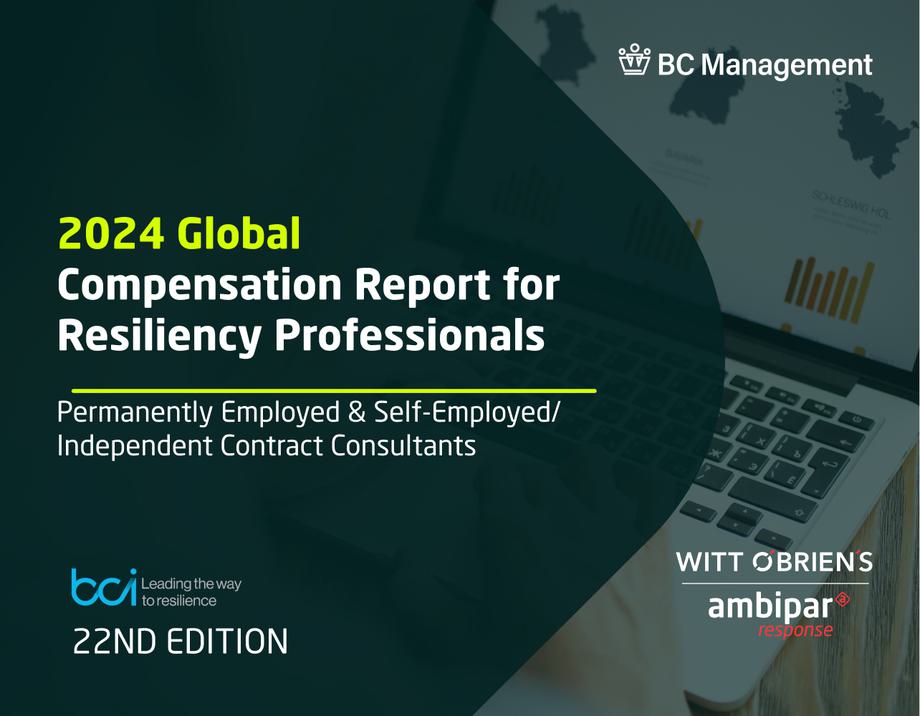
[Download the Full Complimentary Report]
Seeking data tailored to your peer group (by job title or years of BCM of expertise)? Confidentially participate in this study (by November 30th) to unlock your customized dataset.
Tap into our data to benchmark your earning potential and elevate your marketability.
The 22nd Edition Compensation Report for Resiliency Professionals highlights how different factors may impact a professional’s earning potential and our annual study assesses not only years of experience, job titles, degree, and certifications, but also real-world experience and leadership skills. This complimentary report details key findings and trends for both permanently employed professionals as well as contract/temporary/self-employed consultants within the Resiliency (Business Continuity, Disaster Recovery, Crisis Management, and Emergency Management) profession on a global scale. The report highlights several trends and insights that remained consistent with 2023, albeit with a slight downturn in the market. While the report unveils nuances in earning potential and career trajectories, it also serves as a compass navigating through the currents of the job market for Resiliency professionals.
TOP FINDINGS
- Wage Growth: -2.5% Globally (+2.4% USA, +8.1% UK, and +8.4% Canada)
- Global Distribution of Annual Base Compensations: $10,000 - $380,000 USD
- Professionals with an Advanced Degree: 84%
- Respondents who are Certified: 81%
- Changed Jobs in Last Year: 27%
- Unemployment Rate for BCM Profession: 2%
The global data paints a mixed picture, revealing a 4.1% increase in yearly earnings for independent consultants alongside a 2.5% dip in the average annual base compensation for full-time, permanently professionals. However, a closer look at specific countries exposes intriguing shifts. Notably, Canada and the United Kingdom witnessed substantial growth, with increases of 8.4% and 8.1% respectively. Conversely, the United States experienced a more modest rise of 2.4%.
While individual country data points present a rosier picture compared to the global decline in average annual base compensation, it's noteworthy that in 2023, there was a notable surge in compensation for full-time professionals in the USA. During that period, there was a remarkable 10% increase in average annual base compensation from 2022 to 2023. This prompts the question: should the profession be concerned about the significant shift in the USA's average annual compensation increase, from 10% to 2.4%, and what implications might this hold for the future?
In short, no. In 2023, Resiliency professionals found themselves in a favorable position as global financial markets were rebounding post the COVID-19 pandemic. In the US specifically, the unemployment rate reached a 50-year low, and GDP growth was on an upward trajectory. Moreover, our data indicated a significant uptick in organizations planning to hire Resiliency professionals, surpassing 30% in both 2022 and 2023—an increase from 25% in 2021 and 14% in 2018. While the drop from a 10% to a 2.4% increase may seem drastic, it's worth noting that the average annual compensation increase for Resiliency professionals in the US has historically hovered around 2.9% over the past 25 years. The 10% surge observed in 2023 marked the highest increase recorded since we began analyzing compensation data in 2000, and compensations have been consistently rising for Resiliency professionals since 2020 (average annual base compensation increased in the USA from $129,192 in 2020 to $157,918 in 2024).
Fortunately, the job market has been remarkably buoyant for our profession post the COVID-19 pandemic. Despite a recent moderation, which should be seen as a necessary adjustment since ongoing compensation surges of 10% + year to year would be unsustainable, what lies ahead? Let's explore the positive impacts and challenges in the job market, specifically for Resiliency professionals.
Positives:
- Cyber concerns, geopolitical conflicts, supplier/third-party resiliency, archaic technology upgrades, regulatory demands, and cloud migrations have prompted the continued demand for resiliency professionals (up from 14% looking to add personnel in 2018 to 39% in 2024 – noted in the 2024 Resiliency Management Trends Report), with increased visibility and involvement of the C-suite driving this demand.
- A continued tight labor market with the Baby Boomer generation retiring coupled with many organizations preferring hybrid personnel. Both factors have significantly narrowed the available candidate pool. Additionally, the unemployment rate for the USA has been below 4% for 26 consecutive months.
- The CEO confidence also improved in Q1 2024 for the first time in 2 years.
Challenges:
- Global inflation impacting organizations with higher labor costs, delayed expansion, and a reduction in hiring.
- Geopolitical conflicts leading to economic uncertainty, changes in government regulations, and international trade/supply chain disruptions.
- The political uncertainty ahead of the US elections resulting in cautious behavior (hiring freezes or delays) in recruitment decisions.
While compensation increases have tempered compared to 2023, this likely reflects a market adjustment rather than a worrisome trend. Additionally, the Resiliency profession's future job market outlook appears resilient compared to other professions, driven by sustained demand and increased recognition at the executive level. While we anticipate hiring decisions to plateau or experience a slight dip, we expect that the hiring trends will continue to surpass pre-pandemic levels.
How can this report benefit you and your organization? For over two decades, professionals and organizations have depended on our compensation insights to make informed decisions regarding compensation benchmarking, career planning, and recruitment strategies. Our annual report provides valuable information to assess marketability, and we’ve included several pro tips to kick-start your career planning goals – so dig in and enjoy!
This report focuses on current base compensation for both full-time, permanent employees and contract/temporary/self-employed consultants. Base compensation was converted to the US dollar currency for alignment in reporting purposes. Additionally, we’ve highlighted low and high hourly rates for contract consultants. Participants were able to respond to the study as part-time, permanent employees, currently unemployed, or retired, but their responses were not included in the data assessment used for this specific report. Those who confidentially participated in our study also received a customized Resiliency Peer Compensation Dashboard, tailored by their choice of either job title or by years of experience. A customized peer data assessment is essential for compensation benchmarking. We encourage you to participate in our compensation study by November 30, 2024, if you’d like to receive a more in-depth, customized peer assessment.

Cheyene is a global leader with over 25 years dedicated expertise specializing in the resiliency profession. She founded BC Management, Inc. in 2000 and joined Witt O’Brien’s in 2022 as a Managing Director, Talent Management & Research Analytics. Within Witt O’Brien’s (an Ambipar company) she is responsible for overseeing staffing strategies and data research analytics for clients globally in addition to providing career assessments and coaching expertise. She previously served on the board for the Association of Continuity Professionals (ACP) of Los Angeles and Orange County in addition to the National Board for the ACP and the Editorial Advisory Board for Continuity Insights. Cheyene was also the recipient of the ACP Lifetime Achievement award in 2024, the inaugural ACP Hall of Fame award in 2006, and in 2010 she was awarded an Honorary MBCI by the Business Continuity Institute (BCI).